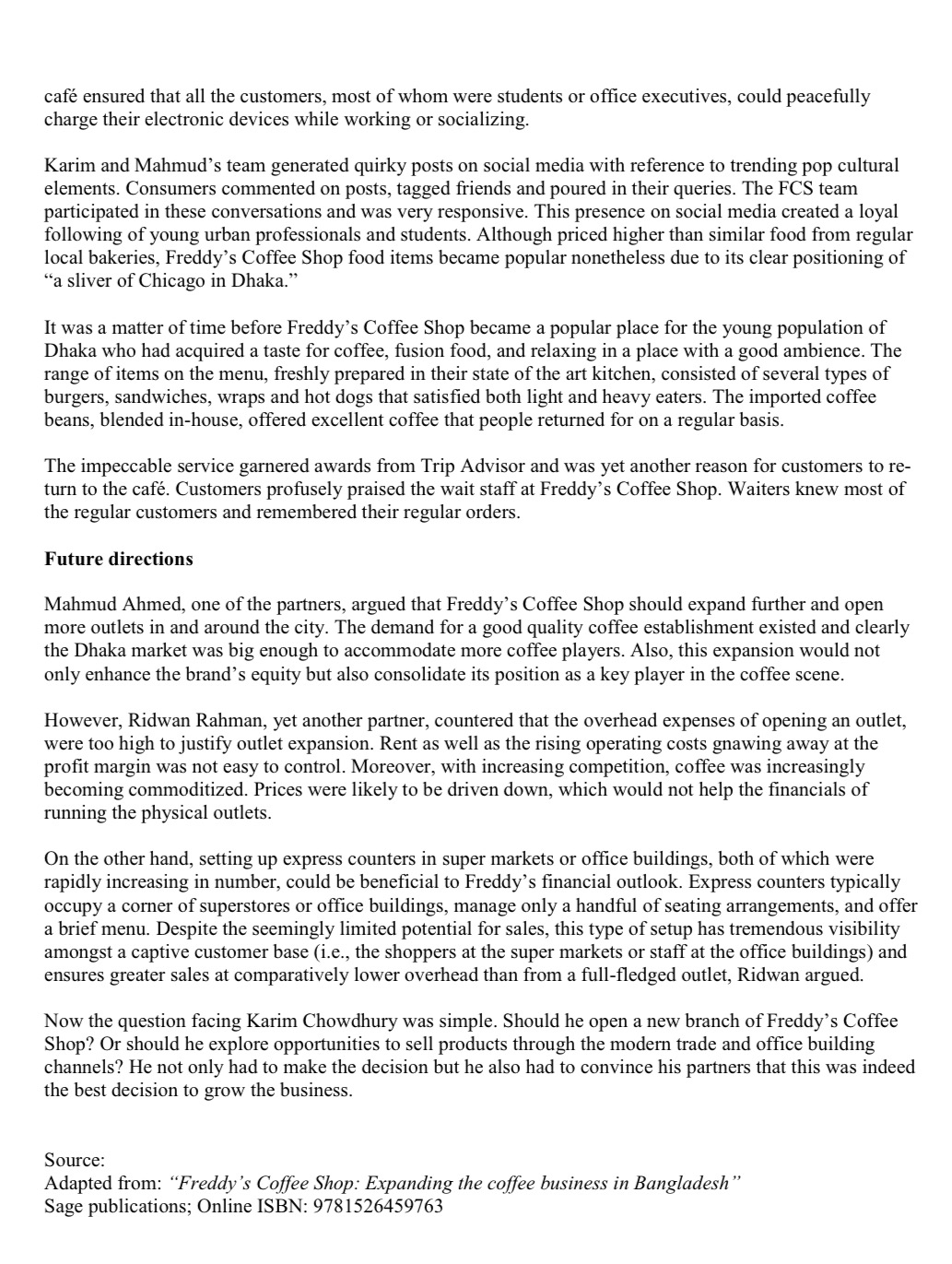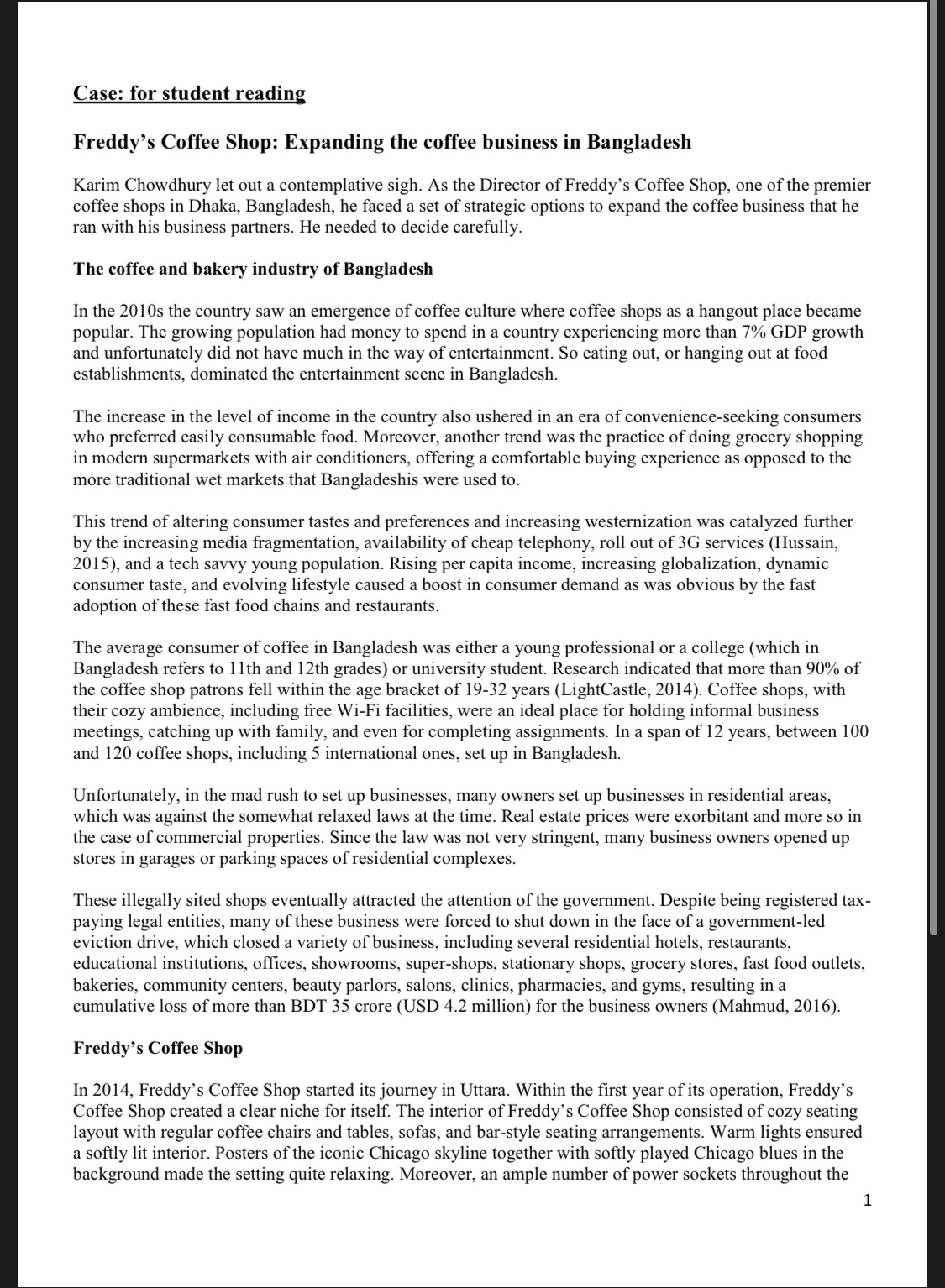9. Develop a campaign for FCS on digital media keeping the upcoming Valentine's Day (or a celebration of your choice) in mind. Mention objective, message and appropriate digital media that will be used. (4 marks)
cafe ensured that all the customers, most of whom were students or office executives, could peacefully charge their electronic devices while working or socializing. Karim and Mahmud's team generated quirky posts on social media with reference to trending pop cultural elements. Consumers commented on posts, tagged friends and poured in their queries. The FCS team participated in these conversations and was very responsive. This presence on social media created a loyal following of young urban professionals and students. Although priced higher than similar food from regular local bakeries, Freddy's Coffee Shop food items became popular nonetheless due to its clear positioning of \"a sliver of Chicago in Dhaka.\" It was a matter of time before Freddy's Coffee Shop became a popular place for the young population of Dhaka who had acquired a taste for coffee, lsion food, and relaxing in a place with a good ambience. The range of items on the menu, freshly prepared in their state of the art kitchen, consisted of several types of burgers, sandwiches, wraps and hot dogs that satisfied both light and heavy eaters. The imported coffee beans, blended in-house, offered excellent coffee that people returned for on a regular basis. The impeccable service garnered awards from Trip Advisor and was yet another reason for customers to re- turn to the cafe. Customers profusely praised the wait staff at Freddy's Coffee Shop. Waiters knew most of the regular customers and remembered their regular orders. Future directions Mahmud Ahmed, one of the partners, argued that Freddy's Coffee Shop should expand further and open more outlets in and around the city. The demand for a good quality coffee establishment existed and clearly the Dhaka market was big enough to accommodate more coffee players. Also, this expansion would not only enhance the brand's equity but also consolidate its position as a key player in the coffee scene. However, Ridwan Rahman, yet another partner, countered that the overhead expenses of opening an outlet, were too high to justify outlet expansion. Rent as well as the rising operating costs gnawing away at the prot margin was not easy to control. Moreover, with increasing competition, coffee was increasingly becoming commoditized. Prices were likely to be driven down, which would not help the nancials of running the physical outlets. 0n the other hand, setting up express counters in super markets or office buildings, both of which were rapidly increasing in number, could be benecial to Freddy's nancial outlook. Express counters typically occupy a corner of superstores or office buildings, manage only a handful of seating arrangements, and offer a brief menu. Despite the seemingly limited potential for sales, this type of setup has tremendous visibility amongst a captive customer base (i.e., the shoppers at the super markets or sta' at the office buildings) and ensures greater sales at comparatively lower overhead than from a full-edged outlet, Ridwan argued. Now the question facing Karim Chowdhury was simple. Should he open a new branch of Freddy's Coffee Shop? Or should he explore opportunities to sell products through the modern trade and ofce building channels? He not only had to make the decision but he also had to convince his partners that this was indeed the best decision to grow the business. Source: Adapted from: \"Freddy 's Coee Shop: Expanding the coe business in Bangladesh " Sage publications; Online ISBN: 9781526459763 Case: for student reading Freddy's Coffee Shop: Expanding the coffee business in Bangladesh Karim Chowdhury let out a contemplative sigh. As the Director of Freddy's Coffee Shop, one of the premier coffee shops in Dhaka, Bangladesh, he faced a set of strategic options to expand the coffee business that he ran with his business partners. He needed to decide carefully. The coffee and bakery industry of Bangladesh In the 2010s the country saw an emergence of coffee culture where coffee shops as a hangout place became popular. The growing population had money to spend in a country experiencing more than 7% GDP growth and unfortunately did not have much in the way of entertainment. So eating out, or hanging out at food establishments, dominated the entettainment scene in Bangladesh. The increase in the level of income in the country also ushered in an era of convenience-seeking consumers who preferred easily consumable food. Moreover, another trend was the practice of doing grocery shopping in modern supermarkets with air conditioners, offering a comfortable buying experience as opposed to the more traditional wet markets that Bangladeshis were used to. This trend of altering consumer tastes and preferences and increasing westemization was catalyzed further by the increasing media 'agmentation, availability of cheap telephony, roll out of 3G services (Hussain, 2015), and a tech savvy young population. Rising per capita income, increasing globalization, dynamic consumer taste, and evolving lifestyle caused a boost in consumer demand as was obvious by the fast adoption of these fast food chains and restaurants. The average consumer of coffee in Bangladesh was either a young professional or a college (which in Bangladesh refers to 11th and 12th grades) or university student. Research indicated that more than 90% of the coffee shop patrons fell within the age bracket of 19-32 years (Li ghtCastle, 2014). Coffee shops, with their cozy ambience, including the Wi-Fi facilities, were an ideal place for holding informal business meetings, catching up with family, and even for completing assignments. In a span of 12 years, between 100 and 120 coffee shops, including 5 international ones, set up in Bangladesh. Unfortunately, in the mad rush to set up businesses, many owners set up businesses in residential areas, which was against the somewhat relaxed laws at the time. Real estate prices were exorbitant and more so in the case of commercial properties. Since the law was not very stringent, many business owners opened up stores in garages or parking spaces of residential complexes. These illegally sited shops eventually attracted the attention of the government. Despite being registered tax- paying legal entities, many of these business were forced to shut down in the face of a government-led eviction drive, which closed a variety of business, including several residential hotels, restaurants, educational institutions, offices, showrooms, super-shops, stationary shops, grocery stores, fast food outlets, bakeries, community centers, beauty parlors, salons, clinics, pharmacies, and gyms, resulting in a cumulative loss of more than BDT 35 crore (USD 4.2 million) for the business owners (Mahmud, 2016). Freddy's Coffee Shop In 2014, Freddy's Coffee Shop started its journey in Uttara. Within the first year of its operation, Freddy's Coffee Shop created a clear niche for itself. The interior of Freddy's Coffee Shop consisted of cozy seating layout with regular coffee chairs and tables, sofas, and bar-style seating arrangements. Warm lights ensured a softly lit interior. Posters of the iconic Chicago skyline together with softly played Chicago blues in the background made the setting quite relaxing. Moreover, an ample number of power sockets throughout the








